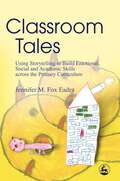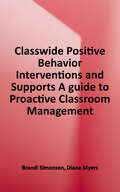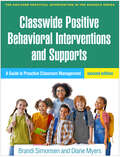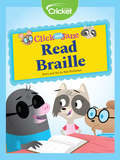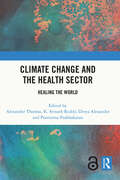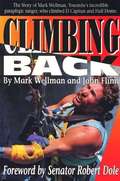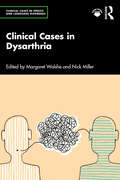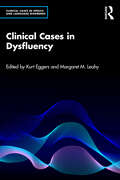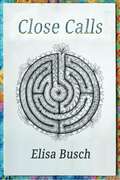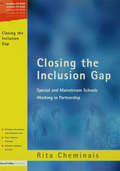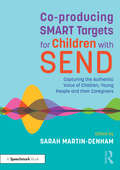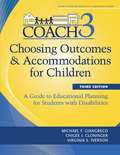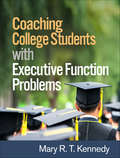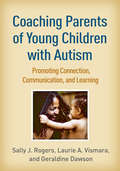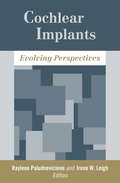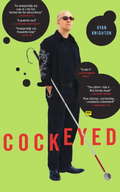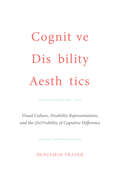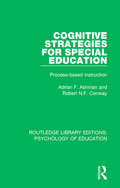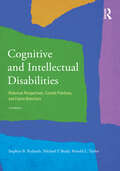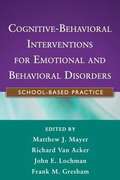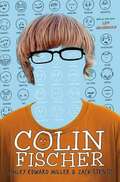- Table View
- List View
Classroom Tales: Using Storytelling to Build Emotional, Social and Academic Skills across the Primary Curriculum
by Jennifer EadesStories and storytelling help children to develop emotional literacy, make sense of their world and appreciate different points of view. Fox Eades shows how storytelling is a crucial element of children's education that can enrich the school curriculum and encourage social and thinking skills. The author discusses the different kinds of story that are useful in the classroom context, including traditional stories, fairy tales and sacred stories, and explores the impact of individual and group dynamics on the telling and reception of these stories. She also considers recognised therapeutic uses of storytelling. She provides a series of sample stories and gives practical tips on adapting these to suit different situations and meet different needs. She also advises on a range of techniques such as using props, allowing `reflection' time and prompting interaction. Sections on collective stories and the child as storyteller explain how children can be inspired to compose their own tales that offer opportunities to practise self-expression and negotiation. This practical and engaging book provides all the tools and techniques needed to use storytelling effectively, and will be an essential resource for primary school teachers and others working with children in educational contexts, social workers and parents.
Classwide Positive Behavior Interventions and Supports: A Guide to Proactive Classroom Management (Guilford Practical Intervention in the Schools)
by Diane Myers Brandi SimonsenA vital classroom management resource, this book shows how to implement positive behavior interventions and supports (PBIS) in K-12 classrooms, regardless of whether PBIS is adopted school-wide. <p><p>The primary focus is universal (Tier 1) support for all students. Practical, step-by-step guidelines are provided for structuring the classroom environment, actively engaging students in instruction, teaching positive expectations, and establishing a continuum of strategies to reinforce positive behavior and respond to inappropriate behavior. <p><p>Numerous real-world examples and learning exercises are included. In a convenient large-size format, the book includes reproducible tools for class-wide PBIS planning and implementation, which can be downloaded and printed for repeated use.
Classwide Positive Behavioral Interventions and Supports: A Guide to Proactive Classroom Management (The Guilford Practical Intervention in the Schools Series)
by Diane Myers Brandi SimonsenNow in a revised and updated second edition addressing the evolving needs of today's K–12 educators, this established classroom resource is written by leaders in positive behavioral interventions and supports (PBIS). Brandi Simonsen and Diane Myers provide a vital classroom management and behavior support toolkit with a primary focus on universal (Tier 1) support. In a convenient large-size format, the book provides step-by-step guidelines for structuring the classroom environment, actively engaging students in instruction, setting clear expectations, and implementing a continuum of strategies to reinforce positive behavior and respond to inappropriate behavior. Teacher-friendly features include classroom vignettes, bulleted chapter objectives, end-of-chapter learning activities, and reproducible forms that can be downloaded for repeated use. New to This Edition Expanded focus on culturally responsive and inclusive practice. Increased attention to connecting with students and families and engaging them in designing, implementing, and monitoring practices. More coverage of integrating Tier 2 and Tier 3 interventions into a classwide PBIS model. Updated research, resources, tools, and examples throughout the chapters. This book is in The Guilford Practical Intervention in the Schools Series, edited by Sandra M. Chafouleas.
Clean to the Touch - Housekeeping for Teenagers and Young Adults with Visual Impairments
by Kathy Bull Susan Lind-Sinanian Eleanor MartinHousekeeping for Teenagers and Young Adults with Visual Impairments
Clear and Present Danger (Duncan Maclain Mystery #10)
by Baynard KendrickFrom the book jacket: Baynard Kendrick has returned to the Crime Club, bringing his famous and amazing blind detective with him-which is a promise that more stories of this favorite sleuth are coming. Absorbed in a chess game, Captain Duncan Maclain was unaware he was being watched by a thickset foreigner--which was a strange state of affairs, for Duncan's acute sensitivity usually compensated for his blindness. In any event, Duncan could not have known of the machinations that were suddenly to involve him in a plot as explosive as uranium and as exciting as a ticking geiger counter. That knowledge only came as he sat in a hospital ... and a man's breathing was silenced in a manner that put Duncan in a clear and present danger.
Click and Jane: Read Braille
by Rob McClurkanDo you know what Braille is? Learn along with Click and Jane as they meet a blind mole in their public library. Together, they learn from the mole that Braille is a way that helps blind people read and write! With the mole, they begin to understand that people can use Braille to read with their hands. Help Click and Jane celebrate the diversity in the world as they interact with their new friend! Now, if only they could keep their other friend CeCe quiet in the library…
Climate Change and the Health Sector: Healing the World
by Alexander Thomas K. Srinath Reddy Divya Alexander Poornima PrabhakaranThe health sector is known to be one of the major contributors towards the greenhouse gas emissions causing the climate crisis, the greatest health threat of the 21st century. This volume positions the health sector as a leader in the fight against climate change and explores the role of the health system in climate policy action. It delivers an overview of the linkages between climate change and the health sector, with chapters on the impact of climate change on health, its connection to pandemics, and its effects on food, nutrition and air quality, while examining gendered and other vulnerabilities. It delves into the different operational aspects of the health sector in India and details how each one can become climate-smart to reduce the health sector’s overall carbon footprint, by looking at sustainable procurement, green and resilient healthcare infrastructure, and the management of transportation, energy, water, waste, chemicals, pharmaceuticals and plastics in healthcare. Well supplemented with rigorous case studies, the book will be indispensable for students, teachers, and researchers of environmental studies, health sciences, and climate change. It will be useful for healthcare workers, public health officials, healthcare leaders, policy planners, and those interested in climate resilience and preparedness in the healthcare sector.
Climbing Back
by Mark Wellman John FinnThere is almost no limit to what we can accomplish--except perhaps in our own minds. Mark Wellman's relentless struggle to survive a disabling accident to become a park ranger and an accomplished wheelchair athlete, and ultimately to climb the sheer granite faces of Yosemite's El Capitan and Half Dome challenges all of us to continue to strive toward loftier goals. Foreword by Senator Robert Dole.
Clinical Cases in Dysarthria (Clinical Cases in Speech and Language Disorders)
by Nick Miller Margaret WalsheThrough the medium of detailed clinical case reports, written by well-respected clinicians and researchers working internationally in the field, Clinical Cases in Dysarthria discusses the challenges, and rewards of applying evidence-based procedures to people with dysarthria in real-life busy routine clinical settings. The text opens with an introduction to the latest research and practices within dysarthria treatment and sets the scene for the eight individual case reports which follow. These case reports form the core chapters of the text and cover themes that range from clinical diagnostic conundrums to applying popular, and/or novel intervention approaches to different populations where dysarthria presents. Each chapter has a specific argument drawing on theoretical principles of assessment and rehabilitation, incorporating latest research evidence to help readers problem-solve similar cases in their clinical practice. Throughout the text, readers are encouraged to ‘think outside the box’. This book will be essential for undergraduate and postgraduate student clinicians within speech and language therapy/pathology courses, as well as clinicians new to the field of dysarthria.
Clinical Cases in Dysfluency (Clinical Cases in Speech and Language Disorders)
by Kurt Eggers Margaret M. LeahyClinical Cases in Dysfluency is an imperative work that introduces dysfluency in clinical and cultural contexts while encouraging reflection on clinical decision-making involving the assessment and management of clients. With inputs from eminent clinical researchers across the world, this text brings together diverse voices and expertise to provide readers with innovative ideas for their own practice. The book assists in refining clinical problem solving and valuing exchanges between clients and clinicians. Featuring real-life case studies covering stuttering and cluttering in children and adults, it showcases the importance of evidence-based practice and practitioner reflection, demonstrating a range of approaches to address problems experienced with dysfluency, and their management. The authors go on to discuss issues of stereotyping, resilience, and therapeutic commonalities in general, and in multicultural contexts, whilst also introducing the discipline of Dysfluency Studies, where stuttering is considered positively in its complexity and not as a disorder. These concepts are effectively further illustrated through accompanying online resources including videos, and weblinks. This is an indispensable resource for students and clinicians in the domains of Fluency, Speech and Language Pathology and Communication Disorders, and will be valuable reading to anyone interested in communication disorders, dysfluencies, and application of theory to practice in these disciplines.
Close Calls: Voices of Love and Fear
by Elisa BuschClose Calls: Voices of Love and Fear is a creative nonfiction memoir spanning the life of a blind woman from childhood to middle age. <P><P> Lisa, the main character, undergoes a shock when separated from her family at age five. Totally blind since her birth in 1954, well before mainstreaming in classrooms is accepted, only a special school in Pittsburgh, a hundred miles away from her rural hometown, is suitable for her education. This separation, along with her shyness at school and her mother's preoccupation with housework when Lisa is at home, creates in Lisa a feeling of sadness that comes to permeate her life. At age seven, her grandfather dies on Good Friday. When he isn't resurrected on Easter as she innocently expects, Lisa's disillusionment with God sets her on a course of mistrust that intensifies years later after a failed love affair. By the time she meets Jerry, who showers her with the attention she has always craved, Lisa cannot feel secure. <P><P> The book describes their marriage, Jerry's struggle with diabetes, the joys and challenges of being a wife and mother, and Lisa's spiritual highs and lows. Throughout the narrative, Lisa keeps asking the question: If God loves me, why does He allow me to suffer such loneliness and loss? This inquiry haunts many a heart and mind, but Close Calls delves into its depth in surprising ways. The author dares to imagine voices of those who travel with her on this journey as well as the voice of an unseen narrator. <P><P> This approach to the narrative seeks to widen the readers' perspectives as well.
Closing the Inclusion Gap: Special and Mainstream Schools Working in Partnership, includes CD
by Rita CheminaisFirst Published in 2004. Routledge is an imprint of Taylor & Francis, an informa company.
Co-producing SMART Targets for Children with SEND: Capturing the Authentic Voice of Children, Young People and their Caregivers
by Sarah Martin-DenhamThis accessible guide supports school and education settings in co-producing SMART targets for education health and care plans, SEN support plans and Personal Education Plans. The book encourages educators to collaborate with children, young people and their caregivers to gain an in-depth understanding of their views, aspirations, strengths and areas of challenge, and to write purposeful, specific, measurable and achievable targets. Each chapter offers successful approaches to capture authentic voice, with a variety of contributors sharing their journey to improve child and family leadership by developing child-centred approaches in their contexts. The book includes case studies and reflective activities to further support the reader with creative and innovative approaches to SMART targets that are underpinned by the child's perspective. With contributions from a range of schools, and across age phases, this book encourages and enables collaboration with children, young people and their caregivers, and will be essential reading for SENCOs, designated leads for safeguarding, teachers and senior leaders in both mainstream and specialist settings.
Coach 3: A Guide To Educational Planning For Students With Disabilities
by Michael F. Giangreco Chigee J. Cloninger Virginia S. IversonCOACH is better than ever! Now with practical updates based on user feedback and a new streamlined format for easier use, the third edition of this bestselling guide can be the key to effective educational planning for students with intensive special education needs in inclusion-oriented schools. Based on 25 years of field-testing and widely used by thousands of education teams, COACH is the educational planning choice for students ages 3-21 in supported general education settings. Retaining the core elements of the popular previous editions, this revised edition organizes planning into a clear step-by-step process that has never been easier to implement. Professionals and families will have an effective process to help them collaborate on individualized educational plans that promote inclusive opportunities for students with a range of developmental disabilities. Education teams will discover how to implement a collaborative and family-centered approach to teamwork explore the current and future status of valued life outcomes identify appropriate curriculum areas to assess rate and select high-priority learning outcomes to be targets of instruction determine which aspects of the general education curriculum should be targets of instruction choose the supports students need to reach their goals develop meaningful annual goals and short-term objectives that reflect each student's individual priorities create a program-at-a-glance that keeps critical information handy throughout the school day COACH comes with the essential materials educators need to engage in collaborative educational planning.
Coaching College Students with Executive Function Problems
by Mary R. Kennedy Mckay Moore SohlbergAlthough executive function difficulties are often addressed in school-age children, there are few resources showing how to help these individuals when they are older. This book presents a dynamic coaching model that helps college students become self-regulated learners by improving their goal-setting, planning, time management, and organizational skills. Ideal for use with students with attention-deficit/hyperactivity disorder (ADHD), learning disabilities, acquired brain injury, and other challenges, Mary R. T. Kennedy's approach incorporates motivational interviewing and emphasizes practical problem solving. User-friendly features include numerous concrete examples, sample dialogues, and print and online resource listings. In a large-size format for easy photocopying, the book contains 21 reproducible forms. Purchasers get access to a Web page where they can download and print the reproducible materials for repeated use.
Coaching Parents of Young Children with Autism: Promoting Connection, Communication, and Learning
by Geraldine Dawson Sally J. Rogers Laurie A. VismaraA growing body of evidence supports the benefits of high-quality parent interventions for building social and communication skills in 0- to 5-year-olds with autism spectrum disorder (ASD). How can clinicians coach parents to effectively incorporate learning opportunities into daily routines at home? From preeminent experts, this practical book explores the role of the coach and reviews the "whats," "whys," and "how-tos" of successful collaboration with parents. Topics include structuring coaching sessions, identifying children's needs, facilitating playful engagement, and deepening parents' understanding of how they can boost skills development during everyday activities. Seventeen reproducible handouts and forms include the multipage P-ESDM Infant–Toddler Curriculum Checklist, ideal for use in telehealth assessments. Purchasers get access to a webpage where they can download and print the reproducible materials in a convenient 8 1/2" x 11" size.
Cochlear Implants: Evolving Perspectives
by Raylene Paludneviciene Irene W. LeighThe cochlear implant debate has changed, as evidenced in this cogent collection that presents 13 chapters by 20 experts, including several who communicate through sign language but also utilize cochlear implants. The impetus for this change stems from recognition that both visual and aural input can enhance the education of deaf children. Divided into four sections, Cochlear Implants: Evolving Perspectives first focuses on the impact of implants in the Deaf community. Chapters in this section examine the issues driving the cochlear implant debate, the ethics of genetic engineering, experiences of implanted adult deaf signers, reflections of deaf mothers who have had their children implanted, and the effects of implants on deaf identity. The second section delves into the mechanics of bimodal processing, including listening strategies that can benefit signing children with cochlear implants. The third section surveys combined aural/visual educational approaches, such as teaching implanted children in an ASL/English bilingual classroom, and applying auditory rehabilitation to a signed communication context. The final section challenges readers to reframe the debate first by exploring sensory politics, then by envisioning an emerging world that requires the Deaf community to connect with it to secure its future. With this information, readers will reach their own conclusions about cochlear implants and auditory and visual approaches to the mastery of both spoken and signed languages.
Cockeyed
by Ryan KnightonThis irreverent, tragicomic, politically incorrect, astoundingly articulate memoir about going blind?and growing up?illuminates not just the author's reality, but the reader's.
Cockeyed: A Memoir
by Ryan KnightonThis memoir chronicles Knighton's struggle to cope with his blindness. While preferring to pretend to be sighted, he has many misadventures. Sometimes we laugh; sometimes we cry; always we cheer him on and hope that he will reach a point of acceptance and competence.
Cognitive Disability Aesthetics: Visual Culture, Disability Representations, and the (In)Visibility of Cognitive Difference (Toronto Iberic)
by Benjamin FraserCognitive Disability Aesthetics explores the invisibility of cognitive disability in theoretical, historical, social, and cultural contexts. Benjamin Fraser’s cutting edge research and analysis signals a second-wave in disability studies that prioritizes cognition. Fraser expands upon previous research into physical disability representations and focuses on those disabilities that tend to be least visible in society (autism, Down syndrome, Alzheimer's disease, schizophrenia). Moving beyond established literary approaches analyzing prose representations of disability, the book explores how iconic and indexical modes of signification operate in visual texts. Taking on cognitive disability representations in a range of visual media (painting, cinema, and graphic novels), Fraser showcases the value of returning to impairment discourse. Cognitive Disability Aesthetics successfully reconfigures disability studies in the humanities and exposes the chasm that exists between Anglophone disability studies and disability studies in the Hispanic world.
Cognitive Learning Theory and Cane Travel Instruction: A New Paradigm
by Richard MettlerA description of cane travel instruction from the structured discovery methodology.
Cognitive Strategies for Special Education: Process-Based Instruction (Routledge Library Editions: Psychology of Education)
by Adrian F. Ashman Robert N.F. ConwayResearch on training programs for students with learning difficulties has usually focused on the development of social and behavioural skills and the acquisition of cognitive interventions and procedures. Originally published in 1989, this book attempts to apply the methods validated by research and synthesize the discoveries made in the psychological laboratory for the benefit of teachers in regular classrooms. It reviews the literature relevant to special needs teaching and traces the development of cognitive research as it applies to education. The authors propose a specific and practical teaching strategy which has been successfully used by those working with students with special needs. Starting from the basic belief that education is an interactive process between the participants, the authors have emphasised the role and responsibility both of the teacher and the learner. Their book should be of value to researchers and practitioners in psychology and special education.
Cognitive and Intellectual Disabilities: Historical Perspectives, Current Practices, and Future Directions
by Ronald L. Taylor Stephen B. Richards Michael P. BradyCognitive and Intellectual Disabilities: Historical Perspectives, Current Practices, and Future Directions provides thorough coverage of the causes and characteristics of cognitive and intellectual disabilities (formerly known as mental retardation) as well as detailed discussions of the validated instructional approaches in the field today. Features include: A companion website that offers students and instructors learning objectives, additional activities, discussion outlines, and practice tests for each chapter of the book. An up-to-date volume that reflects the terminology and criteria of the DSM-V and is aligned with the current CEC standards. Teaching Applications: presents the strongest coverage available in any introductory text on instructional issues and applications for teaching students with cognitive and intellectual disabilities. A unique chapter on "Future Issues" that explores the philosophical, social, legal, medical, educational, and personal issues that professionals and people with cognitive and intellectual disabilities face. This comprehensive and current introductory textbook is ideally suited for introductory or methods courses related to cognitive and intellectual disabilities.
Cognitive-Behavioral Interventions for Emotional and Behavioral Disorders
by Matthew Mayer Richard Van AckerEvidence based and practical, this book presents state-of-the-science approaches for helping K-12 students who struggle with aggressive behaviors, anxiety, depression, ADHD, and autism. It explains the fundamentals of cognitive-behavioral intervention and reviews exemplary programs that offer powerful ways to reach at-risk children and adolescents. Leading authorities thoroughly describe the process of assessment, treatment planning, implementation, and program evaluation. What makes the book unique is its focus on the nitty-gritty of school-based intervention, including how to integrate mental health services into the special education system, overcome obstacles, and provide needed skills to school personnel.
Colin Fischer
by Ashley Edward Miller Zack StentzSOLVING CRIME, ONE FACIAL EXPRESSION AT A TIME Colin Fischer cannot stand to be touched. He does not like the color blue. He needs index cards to recognize facial expressions. But when a gun is found in the school cafeteria, interrupting a female classmate's birthday celebration, Colin is the only for the investigation. It's up to him to prove that Wayne Connelly, the school bully and Colin's frequent tormenter, didn't bring the gun to school. After all, Wayne didn't have frosting on his hands, and there was white chocolate frosting found on the grip of the smoking gun... Colin Fischer is a modern-day Sherlock Holmes, and his story--as told by the screenwriters of X-Men: First Class and Thor--is perfect for readers who have graduated from Encyclopedia Brown and who are ready to consider the greatest mystery of all: what other people are thinking and feeling.
